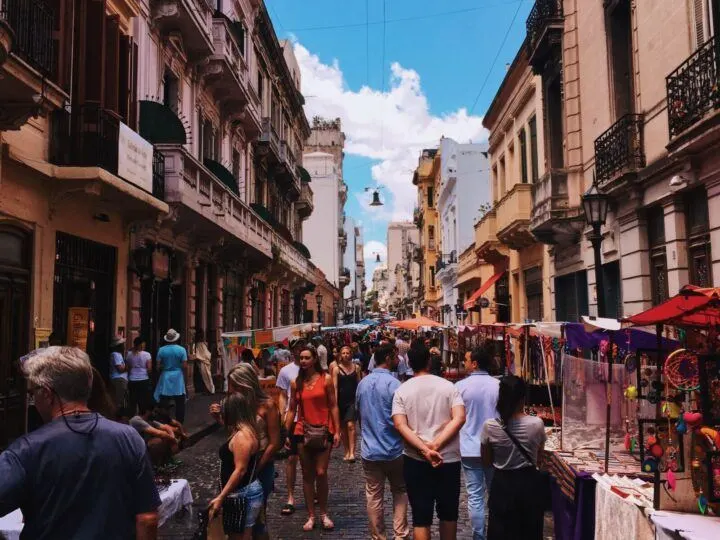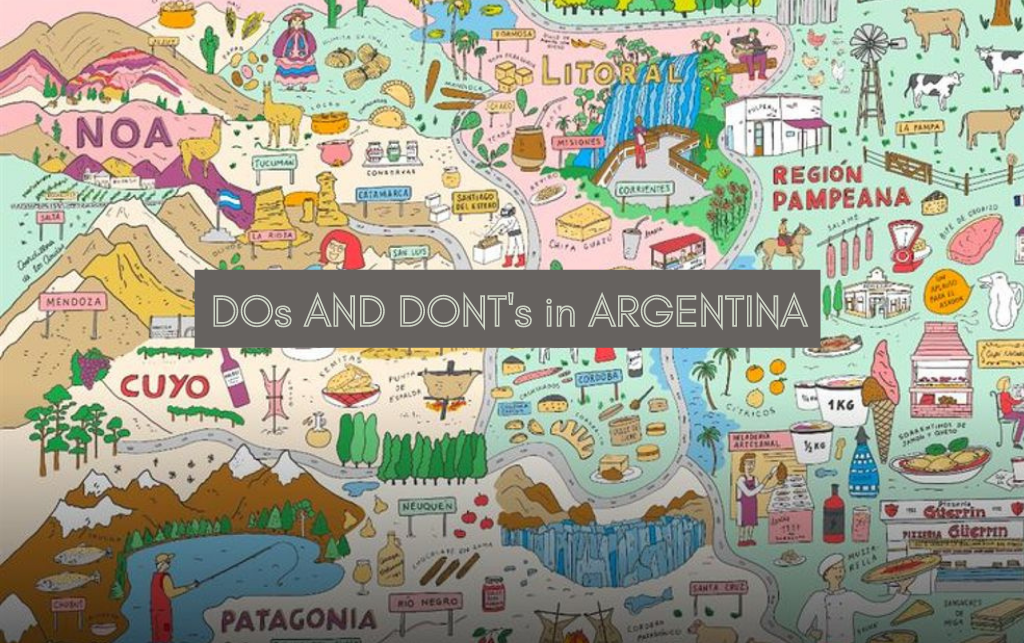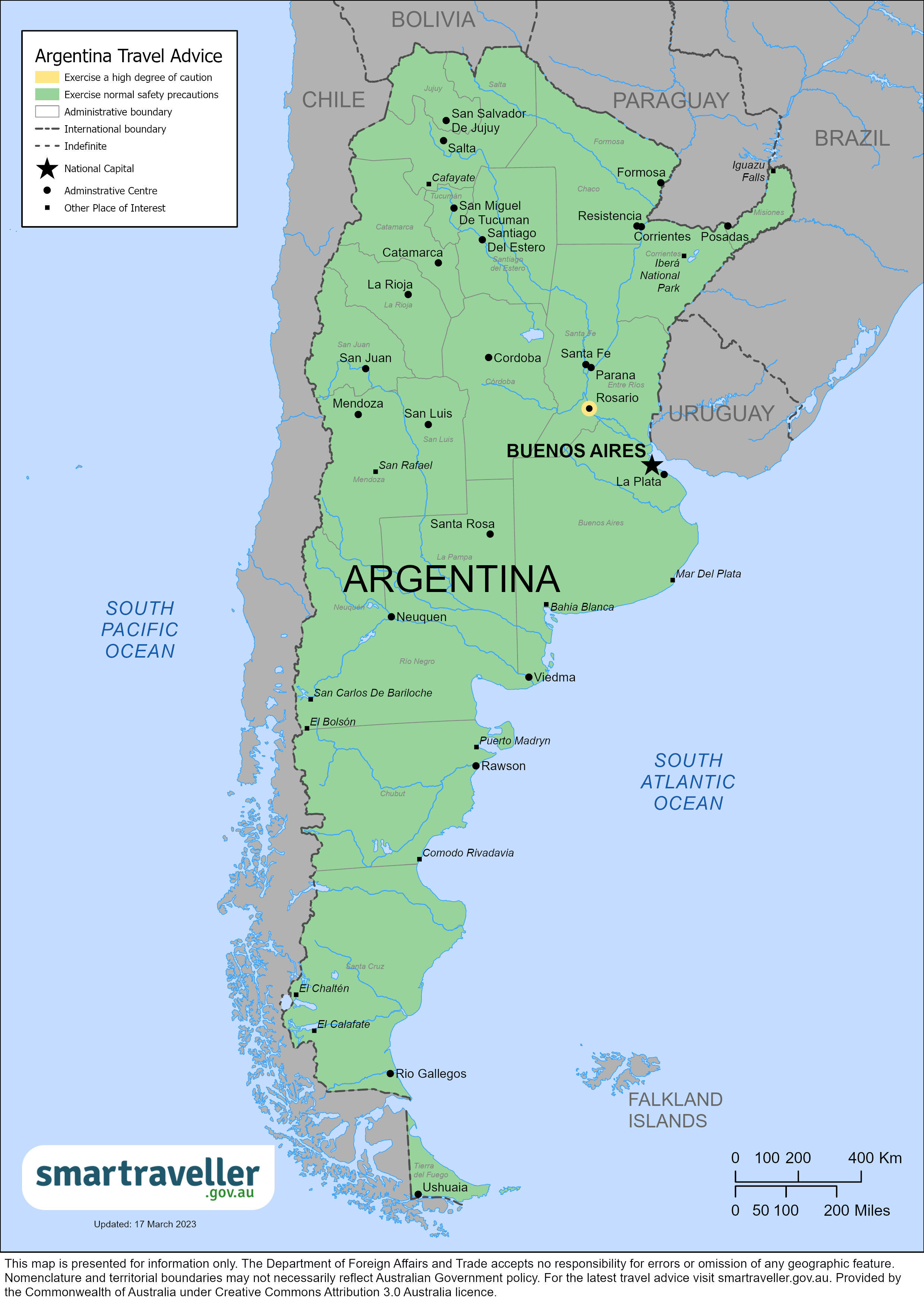What not to do when visiting Argentina
Argentina, a captivating land where vibrant culture, stunning landscapes, and passionate people intertwine. From the pulsating rhythm of tango in Buenos Aires to the serene beauty of the Patagonian glaciers, Argentina offers a wealth of experiences to enchant visitors. However, amidst the allure, it's essential to be mindful of certain faux pas to avoid dampening your Argentine adventure. Read on to discover the "what not to do" when visiting this enigmatic country, ensuring a harmonious and unforgettable journey.
Things to Avoid When Visiting Argentina
Don't Assume Everyone Speaks English
While some Argentinians, particularly in tourist areas, speak English, it's not widespread. Learning a few basic Spanish phrases like "hola," "gracias," "por favor," and "disculpe" will significantly enhance your experience and show respect for the local culture. Attempting to only speak English can lead to misunderstandings and frustration for both you and the locals. It's always a good idea to carry a phrasebook or use a translation app as a backup. Making an effort to communicate in Spanish, even if it's not perfect, will be greatly appreciated.
Avoid Being a "Gringo" Stereotype
Argentina has a history of interactions with foreign tourists and sometimes, tourists fall into predictable, negative stereotypes. Avoid being overly loud, demanding, or disrespectful. Respect local customs and traditions. Be mindful of personal space and avoid being overly familiar with strangers. Remember that patience is key, especially when dealing with bureaucracy or slower service. Dress appropriately for the situation, and be aware of your surroundings. Being respectful of the culture will lead to a more positive experience.
Don't Underestimate Transportation Costs
While public transportation in Argentina is relatively affordable, it can be unpredictable and time-consuming, especially outside of major cities. Factor in potential delays when planning your itinerary. Taxi fares can also vary greatly, so negotiate the price beforehand, or use a reputable ride-sharing app. If you plan on traveling extensively, consider renting a car, but be aware of the driving conditions and potential challenges. Plan your transportation in advance to avoid unexpected expenses and hassles.
Don't Neglect Safety Precautions
Like any major city, Buenos Aires and other urban areas in Argentina have areas with higher crime rates. Be aware of your surroundings at all times. Avoid displaying expensive jewelry or electronics openly. Don't walk alone at night in poorly lit areas. Use reputable taxis or ride-sharing services. Keep your belongings secure and be vigilant against pickpockets, especially in crowded tourist areas. Register your trip with your embassy or consulate, and obtain travel insurance.
Don't Only Stick to Tourist Traps
While tourist attractions are a great starting point, explore beyond the well-trodden paths. Venture into local neighborhoods, interact with locals, and discover hidden gems. Try local restaurants away from the main tourist areas to experience authentic Argentine cuisine. Engage in activities like attending a tango show in a less commercial setting, or visiting local markets. This will provide a richer and more immersive travel experience. Taking time to get away from the typical tourist spots provides a far more enriching and memorable experience.
| Mistake | Consequence | Solution |
|---|---|---|
| Only speaking English | Misunderstandings, frustration | Learn basic Spanish phrases |
| Being disrespectful of local customs | Negative interactions, cultural clashes | Respect local traditions and be mindful |
| Underestimating transportation costs | Unexpected expenses, delays | Plan transportation in advance, negotiate taxi fares |
| Neglecting safety precautions | Theft, injury, other safety risks | Be aware of surroundings, use reputable transportation |
| Only visiting tourist traps | Missing out on authentic experiences | Explore local neighborhoods, try local restaurants |
What are some things tourists should be careful about in Argentina?

Petty Theft and Scams
Argentina, like many tourist destinations, experiences petty theft. Tourists are particularly vulnerable in crowded areas, on public transportation, and at night. Be vigilant about your belongings at all times, especially cameras, phones, and wallets. Pickpocketing is common, so keep valuables close to your body and be aware of your surroundings. Common scams include fake taxi drivers, inflated prices, and counterfeit currency. Always use reputable transportation services and be cautious when exchanging money.
- Keep valuables secure in zipped pockets or hidden bags.
- Be wary of overly friendly strangers who may distract you.
- Only use official taxis or ride-sharing apps.
Safety in Public Transportation
While generally safe, public transportation in Argentina can be crowded and sometimes unsafe, especially at night or in less populated areas. Avoid traveling alone late at night. Be mindful of your belongings, especially on buses and subways. Keep an eye on your bags and personal items to prevent theft. Consider using reputable ride-sharing services if you feel unsafe using public transport, particularly at night or in unfamiliar areas.
- Stick to well-lit and populated areas when using public transportation.
- Be aware of your surroundings and avoid distractions.
- Avoid sleeping or appearing overly intoxicated while on public transport.
Currency Exchange and ATM Safety
Be cautious when exchanging currency. Use official exchange bureaus and banks to avoid scams and counterfeit money. When using ATMs, choose ATMs in well-lit, public areas during the day. Be aware of your surroundings and cover the keypad when entering your PIN. Notify your bank of your travel dates to avoid any issues with your card being blocked due to unfamiliar transactions.
- Compare exchange rates from several sources before exchanging money.
- Avoid exchanging money with street vendors or unofficial sources.
- Check your bank statements regularly for any unauthorized transactions.
Food and Water Safety
While Argentine food is delicious, it's important to practice food safety to avoid stomach issues. Drink bottled water only, particularly outside of major cities. Be cautious about eating street food unless it's visibly cooked fresh and from a reputable vendor. Avoid raw or undercooked meat and seafood. Wash your hands frequently, especially before eating.
- Stick to restaurants with good hygiene standards.
- Peel or thoroughly wash all fruits and vegetables.
- Avoid ice in drinks unless you're certain it's made with purified water.
Health and Medical Care
It’s essential to have comprehensive travel insurance before visiting Argentina. Ensure your travel insurance covers medical emergencies and evacuations. Consult your doctor about necessary vaccinations and any health precautions for the regions you plan to visit. While medical care in Argentina can be good, it might not always meet the standards you're accustomed to. Keep copies of your passport, insurance details, and emergency contacts in a safe place, separate from your originals.
- Pack a well-stocked first-aid kit.
- Learn basic Spanish phrases related to health issues.
- Research local hospitals and clinics in advance.
Do and don'ts in Argentina?

Do's and Don'ts in Argentina
Greetings and Social Interactions
Argentinians are generally warm and welcoming, but understanding their social customs is crucial for a positive experience. Direct eye contact is important during conversations, showing engagement and respect. Avoid being overly familiar with strangers; build relationships gradually. Physical greetings like handshakes or kisses on the cheek (depending on the context and relationship) are common. When meeting someone for the first time, a formal handshake is appropriate.
- Use formal greetings ("Buenos días," "Buenas tardes," "Buenas noches") until invited to use informal ones ("Hola").
- Maintain eye contact during conversations to show attentiveness.
- Be mindful of personal space; Argentinians generally stand closer during conversations than people from some other cultures.
Dining Etiquette
Meals are a significant social event in Argentina. Punctuality is appreciated, especially for formal dinners. It's customary to wait for everyone to be seated before beginning to eat. Conversations are lively and often animated during meals. Tipping is generally included in the bill (10% is a common addition if service was exceptional) however, rounding up is perfectly acceptable. Refuse offers of food politely but briefly, and always thank your host. Expect long leisurely meals, with multiple courses and plenty of conversation.
- Arrive on time for meals, especially formal ones.
- Wait for everyone to be seated before starting to eat.
- Engage in conversation during meals – it’s a social occasion.
Money Matters
While credit cards are increasingly accepted, carrying some cash is essential, especially in smaller towns and for smaller purchases. Negotiating prices is generally not customary, except perhaps in markets. Be aware of scams, especially in tourist areas. Exchange currency at official exchange houses or banks, not on the street. Always keep your belongings secure, and be aware of your surroundings.
- Carry sufficient cash for smaller purchases and in less touristy areas.
- Exchange money at authorized locations to avoid scams.
- Be vigilant about your belongings to prevent theft.
Transportation
Public transportation is readily available in major cities, but can be crowded during rush hour. Validate your tickets on buses and subways to avoid fines. Taxis are common and relatively inexpensive. Ride-sharing apps are also gaining popularity. When using public transportation be aware of pickpockets, especially in crowded areas. Learn basic Spanish phrases related to directions and transportation to make navigating easier.
- Validate your tickets on public transport.
- Be mindful of your belongings to prevent theft.
- Utilize ride-sharing apps or taxis if you feel uncomfortable with public transport at night.
Cultural Sensitivity
Argentina has a rich and diverse culture. Showing respect for local customs and traditions is crucial. Learning a few basic Spanish phrases will greatly enhance your interactions with locals. Be patient and understanding, as Argentinians may have different communication styles than you are used to. Avoid discussing politics or sensitive topics with strangers. Showing an interest in Argentine culture, such as asking about local artists or historical sites, is always appreciated.
- Learn basic Spanish phrases to facilitate communication.
- Show respect for local customs and traditions.
- Avoid sensitive topics like politics unless you know the person well.
What not to bring to Argentina?

What Not to Bring to Argentina?
Argentina is a vibrant country with a unique culture, but certain items might cause you unnecessary trouble or simply be unhelpful during your visit. Generally, avoid bringing anything that is illegal, impractical, or easily replaceable in the country. Packing light is key, as navigating public transport and accommodation can be easier with less luggage. Remember to check Argentina's customs regulations before your trip for the most accurate and up-to-date information.
Unnecessary Electronics and Gadgets
Argentina has readily available electronics and gadgets, often at competitive prices. Bringing bulky or specialized equipment can be cumbersome, especially if you're concerned about theft or damage. Consider leaving behind anything you can easily purchase in Argentina, saving you valuable luggage space and potential hassles.
- Large and heavy laptops: Unless absolutely necessary for work, a tablet or smaller laptop may suffice.
- Specialized adapters: Argentina uses Type C and I plugs; check if your devices are compatible or can utilize a universal adapter.
- Obsolete technology: Older electronics might not be compatible with local systems or be difficult to repair if they malfunction.
Excess Clothing
Argentina experiences diverse climates depending on the region and season. While packing versatile clothing is essential, overpacking is a common mistake. Argentina has many shops where you can easily buy clothing if needed. Overpacking significantly adds to the weight and bulk of your luggage.
- Too many shoes: Choose comfortable walking shoes and one dressier pair if necessary.
- Large quantities of bulky clothing: Pack lightweight and easily layered items.
- Clothes unsuitable for the climate: Research the weather conditions for your destination before packing.
Certain Medications
While bringing a small supply of prescription medication is acceptable with a doctor's note, avoid bringing large quantities of controlled substances. Always check with Argentinean customs regulations regarding medications, as restrictions can vary. It is always wise to confirm that your medication is legal in Argentina before your departure.
- Large quantities of prescription drugs: Bring only what you need for the duration of your trip with proper documentation.
- Over-the-counter medications in excessive amounts: Many common medications are available in Argentina.
- Illegal substances: Bringing any illegal drugs into Argentina carries severe penalties.
Expensive Jewelry and Valuables
Argentina, like many other countries, has its share of petty theft. Bringing expensive jewelry or large amounts of cash can attract unwanted attention and increase your risk of losing valuables. It’s always best to travel with modest items and keep your valuables secure.
- Expensive watches and jewelry: Leave these items at home to avoid potential theft or loss.
- Large amounts of cash: Use credit cards and ATMs wherever possible.
- Unnecessary valuables: Avoid bringing anything you would be devastated to lose.
Inappropriate Clothing
While Argentina generally has a relaxed dress code, it's advisable to be mindful of cultural norms, particularly when visiting religious sites or more formal establishments. Packing extremely revealing or overtly provocative clothing is not recommended. Respect for local customs is always appreciated.
- Extremely revealing clothing: Dress modestly, especially when visiting religious sites.
- Clothing offensive to local customs: Be aware of local sensibilities and dress accordingly.
- Inappropriate footwear for certain activities: Consider the activities you plan and pack suitable footwear.
Where to avoid in Argentina?

Where to Avoid in Argentina
High-Crime Areas in Major Cities
Argentina, like many countries, has areas with higher crime rates. While it's inaccurate to label entire neighborhoods as dangerous, certain zones in major cities like Buenos Aires, Rosario, and Córdoba experience more petty theft, muggings, and violent crime. These are often characterized by higher poverty levels and less visible police presence. It's crucial to be vigilant in these areas, especially at night. Avoid walking alone, displaying expensive jewelry or electronics, and carrying large amounts of cash. Utilize well-lit, busy streets and reputable transportation options.
- Avoid poorly lit streets and isolated areas at night.
- Be aware of your surroundings and avoid distractions.
- Use official taxis or ride-sharing services rather than unofficial options.
Remote and Rural Areas without Proper Infrastructure
While Argentina boasts stunning natural beauty, venturing into remote and rural areas without adequate preparation can pose significant risks. Lack of reliable cell service, limited access to healthcare, and potential for car breakdowns or accidents make these locations potentially dangerous, especially for solo travelers or those unfamiliar with the terrain. Thorough research, informing someone of your itinerary, and having a reliable vehicle are crucial for mitigating risks in such areas.
- Always inform someone of your travel plans, including your route and estimated return time.
- Ensure your vehicle is in good condition and you have appropriate spare parts.
- Carry a fully charged power bank for your mobile device, even if cell service is unreliable.
Areas with Political Instability or Social Unrest
While generally stable, Argentina can occasionally experience periods of political instability or social unrest, particularly during times of economic hardship. These periods can lead to protests, demonstrations, and potential for violence. Staying informed about current events through reputable news sources and avoiding areas where protests or demonstrations are taking place is crucial to personal safety. Following local advisories from your embassy or government is also highly recommended.
- Monitor news reports for any signs of unrest or potential conflict.
- Avoid attending or getting close to any protests or demonstrations.
- Stay updated on any travel advisories issued by your government or embassy.
Areas Prone to Natural Disasters
Argentina is prone to various natural disasters, including floods, earthquakes, and wildfires. Depending on the time of year and specific region, certain areas face a higher risk. Before traveling, research the potential risks in your chosen destination and check weather forecasts regularly. Having appropriate insurance and emergency preparedness plans can significantly reduce the impact of unexpected events.
- Check weather forecasts before and during your trip and be prepared for potential changes in weather conditions.
- Purchase travel insurance that covers natural disasters.
- Familiarize yourself with emergency protocols and evacuation plans.
Border Regions with Limited Security
Argentina shares borders with several countries, and some border regions may have limited security and increased risks of smuggling and criminal activity. While not necessarily dangerous for tourists passing through established border crossings, avoiding unauthorized border crossings or venturing into remote border areas is strongly advised. Sticking to well-traveled routes and using official transportation services are key to minimizing risk.
- Only use official border crossings and avoid unofficial paths.
- Utilize official transportation services when traveling near border regions.
- Be mindful of your belongings and avoid displaying valuable items.
What are some common cultural faux pas to avoid in Argentina?
Argentina has a rich and vibrant culture, and understanding its nuances is key to a positive experience. One common mistake is assuming a familiarity that doesn't exist. Argentinians value personal space and generally don't engage in overly familiar greetings with strangers. Avoid being overly loud or boisterous in public spaces, as this can be seen as disrespectful. Additionally, Argentinians are known for their passion, and while friendly conversation is welcomed, avoid interrupting or talking over someone. Punctuality is appreciated but not always strictly adhered to, especially in social settings; however, being excessively late for a business meeting or formal appointment is still considered impolite. Finally, learn a few basic Spanish phrases – even a simple "hola" and "gracias" will go a long way in showing respect and goodwill. Showing genuine interest in their culture and customs will be greatly appreciated and foster positive interactions. Remember, Argentinians value respect and politeness above all else.
How should I handle money and tipping in Argentina?
Navigating money and tipping in Argentina requires some understanding of local customs. While credit cards are increasingly accepted in larger cities and tourist areas, carrying some cash, particularly smaller bills, is essential for smaller purchases and interactions, especially outside of major urban centers. When it comes to tipping, the norms differ depending on the establishment. In restaurants, a 10% tip is generally appreciated for satisfactory service, but you can round up or leave a bit more for exceptional service. For taxi rides, rounding up the fare to the nearest convenient amount is usually sufficient. However, it's always best to observe the local practices – if you see others leaving a tip, follow their lead. Do not expect the same tipping standards as you might find in other countries, as it's often less prevalent in some services than in others. Remember to always count your change carefully, and be aware of potential scams, especially in busy tourist areas. Understanding these nuances will ensure a smoother financial experience during your trip.
What are some things I shouldn't say or do related to politics and history?
Argentina has a complex and often sensitive political and historical past. It's crucial to approach these topics with respect and sensitivity. Avoid making generalizations or assumptions about Argentinian politics or history based on limited knowledge. Refrain from expressing strong opinions on sensitive issues, particularly those related to the military dictatorship or the Falklands/Malvinas War, unless you are well-versed in the nuances of the situation. Instead, show a genuine interest in learning about their perspectives and experiences. Engage in conversations with Argentinians to gain a better understanding, but listen more than you speak, showing respect for their knowledge and perspectives. Remember that history is viewed differently by different people, and sensitivity is key to a positive interaction. Approaching these topics with humility and an open mind will foster meaningful connections and avoid causing offense.
What are some safety precautions I should take while visiting Argentina?
Like any other country, Argentina has its share of safety concerns. It's crucial to take basic safety precautions to protect yourself and your belongings. Be aware of your surroundings, especially in crowded areas or at night. Avoid displaying expensive jewelry or electronics openly. Be mindful of pickpockets, especially in tourist hotspots. Use reliable transportation methods, such as registered taxis or ride-sharing services. Don't leave your belongings unattended in public places. Before your trip, familiarize yourself with local emergency numbers and have a plan in case of emergencies. It's also a good idea to inform your family or friends of your itinerary. Trust your instincts – if a situation feels unsafe, remove yourself from it. By practicing common sense and being vigilant, you can greatly reduce your risk of becoming a victim of crime and enjoy a safe and memorable trip to Argentina.
Deja una respuesta